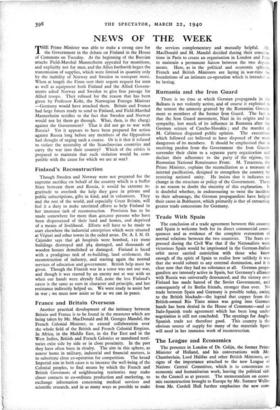Rumania and the Iron Guard
There is no time at which German propaganda in the Balkans is not violently active, and of course it exploited to the utmost the amnesty granted by the Rumanian Govern- ment to members of the former Iron Guard. The fact is that the Iron Guard movement, Nazi in its origins and its sympathy, lost much of its influence in Rumania after the German seizure of Czecho-Slovakia ; and the murder of M. Calinescu disgusted public opinion. The executions which followed are believed to have disposed of the most dangerous of its members. It should be emphasised that in receiving pardon from the Government the Iron Guards surrender their claim to a separate party organisktion and declare their adherence to the party of the regime, the Rumanian National Renaissance Front. M. Tatarescu, the Prime Minister, explains the reconciliation as a measure of internal pacification, designed to strengthen the country by restoring national unity. He insists that it indicates no change in the structure or policy of the Government. There is no reason to doubt the sincerity of this explanation. It is doubtful whether, in endeavouring to twist the incident to their advantage, the German propagandists have helped their cause in Bukharest, which primarily is that of extracting greater trade concessions for Germany.






































 Previous page
Previous page